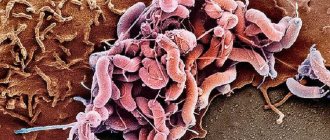Black feces can appear either from harmless reasons or as a result of dangerous processes occurring in the body that require immediate treatment. Normally, human stool should be brownish-yellow or dark brown in color. These shades are due to the admixture of bile in excrement.
- Etiology
- Symptoms
- Diagnostics
- Treatment
- Prevention
There are many reasons why black feces are suddenly observed in a person. The most common are the consumption of foods, including prunes, taking certain medications and bleeding in the gastrointestinal tract. This feature of discharge is often observed in pregnant women - this is due to the fact that the body does not receive large quantities of vitamins or nutrients.
In rare cases, black stool is a serious symptom, if detected, you should immediately consult a doctor, because in medicine there are a number of chronic disorders in which just such a change in the color of the discharge appears.
Causes of dark stools
The reasons for the appearance of black feces can be different and its appearance does not always mean something bad. This phenomenon can occur in both women and men. Children are also not immune to black feces. All the reasons why stool turns black can be divided into two main categories:
- Physiological;
- Pathological.
Physiological causes are less dangerous and usually go away once the source of the problem is eliminated. Pathological ones are associated with dangerous changes in the body and often require medical intervention. The main factor in identifying the root cause is the general well-being of a person.
Rectal cancer
Oncology of the rectum
is a cancer that often occurs in older people. However, current statistics show that recently this disease has become more common in people under 40 years of age. In the initial stages, the tumor can be localized only on the walls of the rectum, but over time it grows and completely blocks the intestinal lumen. The adult body can no longer function in its usual rhythm.
Due to the formation of a tumor, mucus and blood begin to be released in the rectum. This happens not only during the process of defecation. The fluids mix with the stool, which makes them black. This phenomenon can also occur in people who suffer from advanced anal fissures and hemorrhoids. It is important to start treatment in a timely manner, because black stool in oncology means the development of serious complications.
Share with your friends
Do something useful, it won't take much time
What foods cause black stool?
If you see your own black feces, you shouldn’t panic right away. Most likely the reason is the food eaten the day before. In the vast majority of cases, this is what causes the change in color of stool.
The most common foods that cause blackening of stool are:
- after beets and salads with them;
- coffee;
- red wine;
- blueberries, blueberries, currants, pomegranate, black grapes, chokeberries, blackberries;
- dried prune fruits;
- bananas;
- tomatoes and juice from them;
- so-called blood sausages and medium-rare steaks;
- liver.
Moreover, there is no need to worry if the change in color of stool is not accompanied by painful or uncomfortable sensations. Just observe your stool patterns for a few days. If the changes are caused by food, then during this time everything will return to normal.
Cirrhosis of the liver
Liver cirrhosis is a disease in which liver tissue is damaged and dies. In the initial stages, stool may be lightened or white, which is caused by the lack of production of a specific secretion. However, cirrhosis can provoke the development of serious bleeding, which turns light-colored stool black. Also, with cirrhosis of the liver, the hemorrhoidal veins dilate significantly.
Liver cirrhosis is a disease that most often occurs in men who lead an unhealthy lifestyle.
Over time, they become inflamed and burst, and because of the blood released, the stool acquires this color. Typically, stool in cirrhosis meets the following characteristics:
- may have bloody impurities;
- have a liquid, unformed consistency;
- have small strings of mucus;
- always come out in small quantities;
If you begin to notice that a large amount of blood is coming out with your stool, you should consult a doctor. If the stool suddenly turns black, you can call an ambulance - in case of cirrhosis, this may indicate complete death of the liver. The blackening of stool during bleeding is due to the fact that the blood, which had been in the stomach for some time, had time to be digested and captured part of the processed food. Your doctor will be able to tell you exactly what disease the black stool is a sign of.
Medicines that cause stool to darken
These include:
- Activated carbon, which is often taken for intoxication. During the removal of coal from the body, the color of the stool changes to black. This phenomenon can last for several days, and then everything goes away without consequences.
- Medicines aspirin, nimesil, ibuprofen and long-term use of antibiotics can also change the color of stool.
- Bismuth-containing drugs prescribed for the treatment of intestinal ulcers and other pathologies developing in the duodenum.
- The color of excrement is affected by certain vitamins (which include blueberries or iron) and iron-containing preparations. A change in stool color is not an indication to stop taking the drug. Feces may remain black throughout the course of therapy and up to 7 days after its completion.
Stomach ulcer
Stomach ulcer is a disease of the organ mucosa
, in which trophic ulcers form on its surface.
Black feces do not appear immediately with this disease, but it indicates serious damage to the stomach. Typically, this phenomenon occurs 12 hours after the onset of internal bleeding. If it is large enough, the stool becomes tarry. This occurs due to the movement of a large amount of split blood through the intestines. If a small amount of blood is released in the stomach, the stool will be formed. The cause of stomach ulcers is:
- stomach injury;
- poor nutrition;
- consequences of other gastrointestinal diseases;
- long-term use of medications;
- hereditary predisposition;
- frequent emotional stress.
The appearance of black stools may indicate a period of exacerbation of the ulcer. This stool color indicates a high content of iron oxide in the stomach, which is released during the fermentation of hemoglobin in the intestines. If you experience black diarrhea, you should consult a doctor. Sometimes this symptom can quickly give way to constipation and loss of appetite. It is very important to ensure proper functioning of the intestines so that the contents do not linger in the stomach and irritate its walls. The causes of black stool in men may be the consumption of alcoholic beverages.
Dark feces: list of possible diseases
The appearance of dark stool in an adult may indicate the following diseases:
- Food poisoning is considered the most common cause of any problems with feces in humans. Various viruses and bacteria that penetrate the gastrointestinal tract with dirty, stale or poorly prepared foods can provoke intoxication of the body. Poisoning can be suspected if accompanying symptoms occur, such as attacks of nausea and vomiting, stool upset, headache and dark green stool. Certain types of poisoning pose a serious threat to the patient's health and can provoke dysbacteriosis and chronic enteritis.
- Ulcers are a very common cause of internal bleeding. Ulcers are open wounds that bleed when they come into contact with food. The blood is then transported in the large intestine and mixed with feces.
- Intestinal diverticulitis is a dangerous pathological condition that is accompanied by a rapidly progressing inflammatory process in the intestinal mucosa. Diverticula are small protrusions of the intestinal walls, resembling a hernia. The leading cause of their appearance is considered to be weakness of the intestinal muscles and constant problems with bowel movements. Diverticulum usually manifests itself acutely, and inflammation of the intestines causes changes in the color and composition of stool, as well as a rise in body temperature and increased gas production. In addition, the patient complains of lack of appetite, attacks of nausea and vomiting, combined with a deterioration in general health.
- Bleeding in the gastrointestinal tract most often appears as a complication of a stomach ulcer or varicose veins. When there is bleeding in the digestive system, the patient complains of an unexpected deterioration in general health, the development of severe vomiting, a change in the consistency of the stool and its dark color. This condition is considered extremely complex and can lead to the death of the patient.
- Esophageal varicose veins are a disruption of the esophageal veins in the esophagus. The disease can manifest itself as dull pain behind the sternum, nausea, the appearance of black stools of liquid consistency, and sudden weight loss.
- Colitis is a disease that is accompanied by the development of an inflammatory process in the colon. The main reason for its development is considered to be bacterial infection, chemical poisoning and severe stress. In fact, the tendency to inflammatory processes in the intestines is inherited. Signs of colitis include a constant urge to go to the toilet, dark stool, a rise in body temperature, and pain in the abdomen. Most often, with this pathology, the stool becomes liquid and may contain blood. This sign may indicate that the human body cannot sufficiently absorb carbohydrates.
- Haemorrhoids. Characterized by inflammation of the hemorrhoidal veins. It occurs due to heavy lifting, a sedentary lifestyle, constipation and problems with bowel movements. It manifests itself as bleeding outside the stool - the feces may remain brown, and a small stream of blood flows separately from the anus, which confuses the patient.
- Cancer of the stomach, esophagus, duodenum - oncological processes that develop as a result of ulcers, polyps and other diseases, manifested by periodic darkening of the color of stool and vomiting with blood.
Black feces caused by gastrointestinal pathology require immediate examination by a doctor, identification of its causes and treatment. Internal bleeding may manifest itself in a slightly different way, requiring emergency assistance - calling an ambulance. Bleeding from the gastrointestinal tract is usually accompanied by additional symptoms:
- weakness, dizziness;
- tachycardia;
- vomiting blood;
- sharp pallor.
With severe bleeding, acute heart failure develops quite quickly, accompanied by pain. The condition will only get worse and can be fatal. Before the ambulance arrives, it is not recommended to take medications on your own to stop it. In the postoperative period, such a symptom may indicate the development of bleeding.
Dark stool during pregnancy: causes of the condition
Pregnant women can also experience dark stool, which is directly related to the presence of the following conditions:
- Iron-deficiency anemia. A change in stool color is not caused by the disease itself, but by the need to correct the condition of the body with iron supplements (without them, the hemoglobin level remains unchanged, which will affect the condition of the fetus and mother).
- Impaired liver function. Women notice additional (and in some cases excessive) load on the liver during pregnancy. This is due to an expansion of the diet and the need to take certain medications. A sign of a liver problem will be, first of all, very dark stools, an unpleasant bitter taste where the root of the tongue touches the palate, a dull pain in the right side, increased fatigue, and drowsiness.
Despite these reasons, expectant mothers need to know that both of these conditions can be eliminated even before pregnancy - correcting hemoglobin levels and treating the liver. It is also necessary to emphasize that these health problems are not associated with hormonal changes inherent in the body of pregnant women.
Varicose veins of the esophagus
Esophageal varices are a condition in which the blood vessels become inflamed and stretched. For a long time, this disease may not manifest itself in any way; a person lives his usual life and does not think about his pathological condition. When the affected blood vessels
overstretched, they rupture, which leads to internal bleeding.
If you do not provide medical assistance to a person in time, there is a high risk of death. You can recognize a ruptured vein:
- characteristic abdominal pain;
- a sharp decrease in blood pressure;
- weakness, dizziness;
- vomiting with blood;
- black chair.
Diagnostics
In the absence of obvious signs of illness, you can observe a change in the color of the stool for several days. If the cause is the intake of coloring substances into the body along with foods, then after eliminating them from the diet, the color should normalize. If the problem persists for several days, you should consult your doctor for diagnosis.
Problems in the digestive system are indicated by the black color and smell of feces. At the same time, by the nature of the smell, you can determine the most likely problem area in the human body.
The nature of the smell says a lot:
- putrefactive - problems in the digestive system associated with disruption of protein breakdown processes or chronic inflammation of the large intestine;
- rancid - problems with the digestive tract associated with pancreatic secretion or lack of bile in the intestines;
- sour - the presence of dyspepsia, that is, enzyme deficiency.
To determine the causes and treatment, the following tests are prescribed:
- Coprogram. The naked eye evaluates the color of the stool, mucus and pieces of undigested food. Small inclusions in the stool, such as villi or strings, can also be detected. This method allows you to detect altered red blood cells in the stool using a microscopic examination - a sign of bleeding from the gastrointestinal tract.
- Analysis of stool for dysentery group with determination of sensitivity to antibiotics. If black or dark green feces appear, diarrhea, fever and stomach pain, these are symptoms of an infectious disease (shigellosis, salmonellosis).
- Stool test for occult blood (Gregersen test or ICA). Prescribed when the color of the stool is normal, if there is a sign of internal bleeding. A week before the test, you must follow a special diet, which means excluding meat, liver, fish and tomatoes. Avoid the use of oral medications (bismuth, iron). Do not brush your teeth for 3 days before the test.
- Complete blood count with leukocyte formula. Tarry stool indicates heavy bleeding, which is accompanied by clinical signs of anemia (pallor, shortness of breath) and changes in blood tests: the level of hemoglobin and hematocrit becomes less than normal.
Such diagnostic methods make it possible to accurately determine the presence of pathological changes in the human body and develop therapeutic treatment tactics.
Black stool and toddlers, when to start worrying
In the first days of life, black stool is meconium.
I would immediately like to reassure parents - in children, diseases that cause changes in the color of stool are very rare. But there are cases that can cause a commotion!
We arrived from the maternity hospital, took off the diaper and found black feces. Parents are in shock! Do not be nervous! Most likely it is meconium. This discharge is completely normal for babies during the first few days of life.
The color of feces depends on its composition. Meconium consists of the remainder of amniotic fluid, inclusions of bile, and epithelial cells. In appearance it is a viscous, black discharge, possibly with a green tint.
A few days will pass and the stool will return to its normal yellow-brown color. If the baby is bottle-fed, his stool may also have a greenish or greenish-brown tint.
Read: Preparing for an appointment with a proctologist, how a proctological examination is carried out
Many modern infant formulas contain iron to prevent anemia. It gives such an interesting shade to feces. This fact is usually described in the instructions for the mixture, so read it carefully! For older children, the reasons are usually banal:
- Dyes in food – beets, blueberries, currants, prunes
- Medications
Parents! Remember! If the child is active, runs and jumps, eats well and is not capricious, then the black nuisance in the potty is an accident! But if you experience nausea, vomiting, or a general deterioration in your condition, then you need to urgently contact a medical facility!
Under what circumstances do you need to urgently call an ambulance?
If the cause of unusual stool in a person is bleeding or the development of a disease, it is usually accompanied by:
- abdominal pain;
- increase in temperature (sometimes very sharp and dangerous - up to 41˚C);
- dizziness;
- nausea and/or vomiting (including blood);
- presence of blood in feces;
- bleeding from the anus.
If you have at least one of the listed symptoms, immediately call an ambulance or try to get to the hospital yourself as soon as possible!
It is especially important to do this if you are diagnosed with an ulcer, cirrhosis, hepatitis, or another disease described in the previous sections. Remember that even a 5-minute delay can cause death, since often very dark or black-green stool is a consequence of internal bleeding. Also, do not delay visiting a doctor if you have been experiencing symptoms for several days or the problem has occurred in a small child older than one week.
Treatment
Before carrying out therapy, it is necessary to determine why the stool has turned black. If harmless circumstances lead to this, there is no need for therapy. But you should not completely exclude such foods, fruits, prunes and vegetables from the diet - you just need to reduce their quantity and monitor the calorie content of food consumed per day. Then the color of stool will gradually return to normal. Medicines should be handled in the same way. A change in the color of the discharge in these cases does not pose a threat to the health of the child or adult.
In the case where the darkening of the feces was caused by internal processes of the body and bleeding, it is necessary to immediately call an ambulance, especially if a child was injured, and go to a medical facility as soon as possible. If the child’s condition worsens before the doctors arrive, it is necessary to provide him with rest and not allow him to eat or drink (with the exception of purified cold water). In any case, the doctor can prescribe two methods of treatment, depending on the factors of occurrence - surgery or medication. With any therapy, it is necessary to adhere to a low-calorie diet and bed rest.
Prevention
Prevention of black stool is:
- consuming small amounts of foods such as black pudding, grapes, prunes, blueberries, tea and coffee, as well as medications that can color the discharge;
- maintaining a balanced diet - meals should not be high in calories;
- At the first symptoms of gastrointestinal dysfunction, seek advice from specialists. This should be done as soon as possible if this feature of the color of feces was discovered in children, because pathological processes in a child’s body proceed much faster than in an adult;
- regular visits to an obstetrician-gynecologist by a pregnant woman;
- undergoing examination at the clinic at least twice a year.
Light-colored feces in an adult: causes and treatment Epilepsy: symptoms, causes and treatment Low blood pressure: causes, symptoms, treatment and consequences Angina pectoris - what is it? Types, causes, symptoms, do's and don'ts











